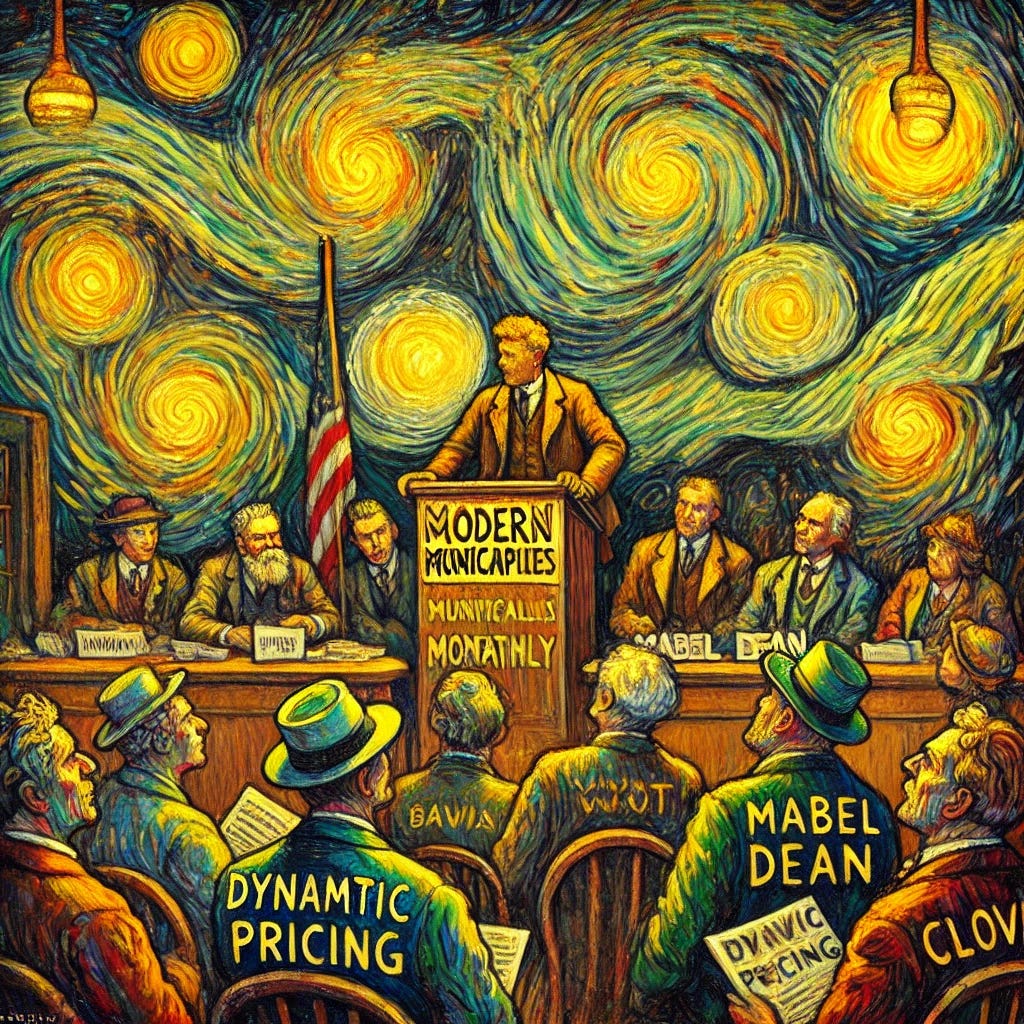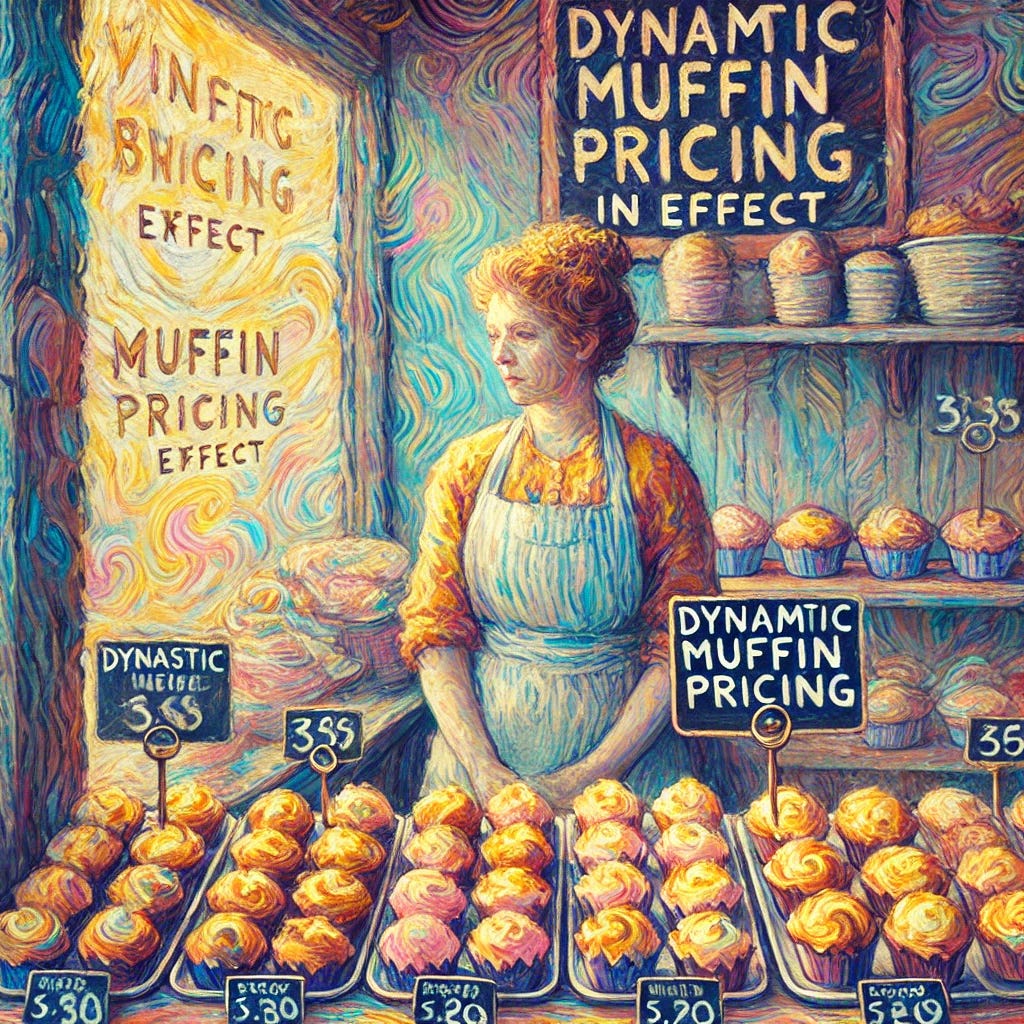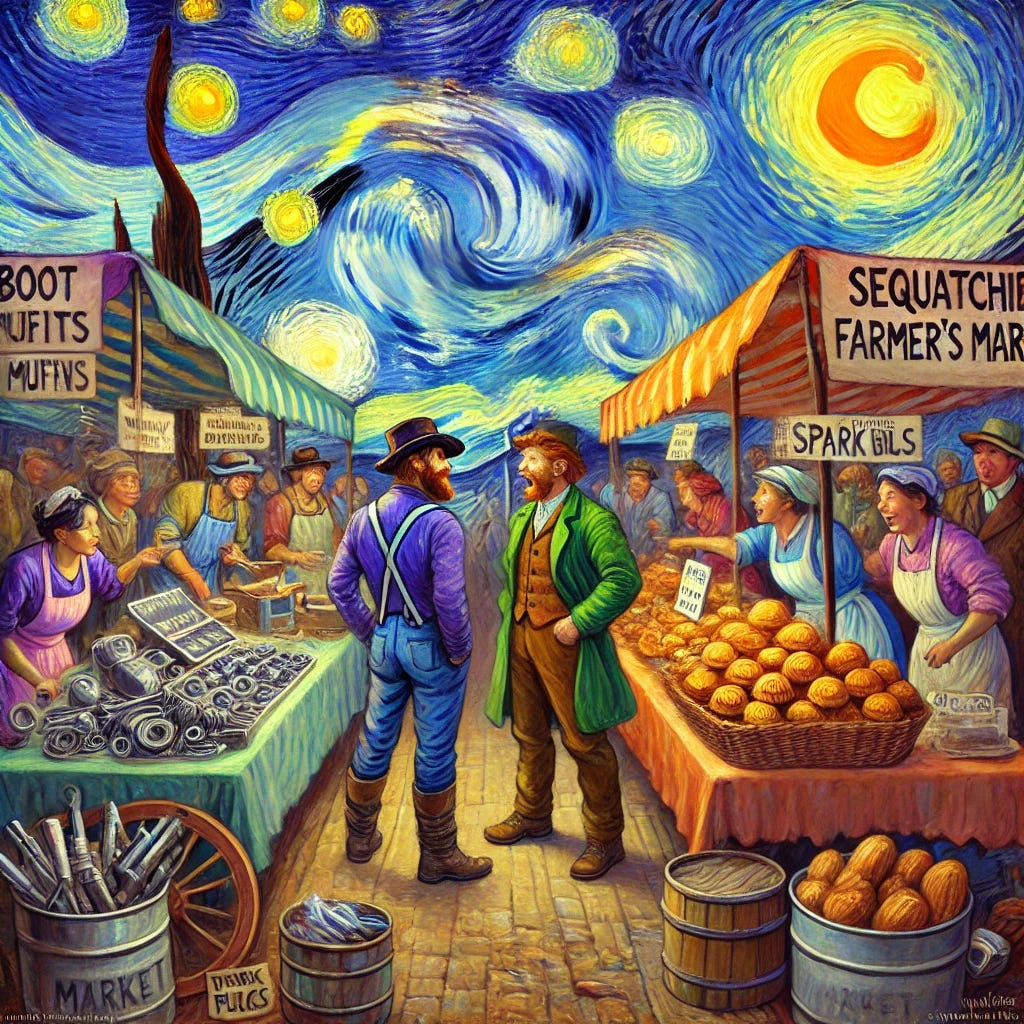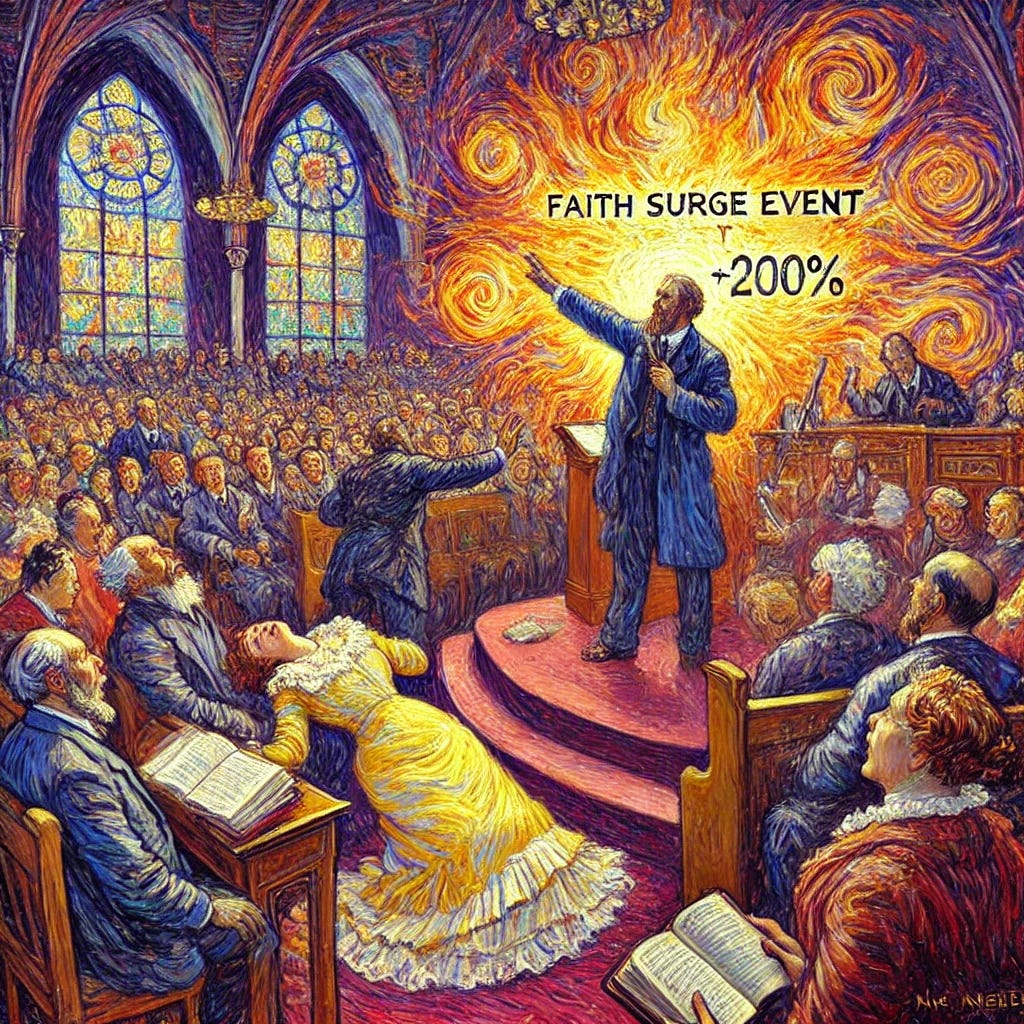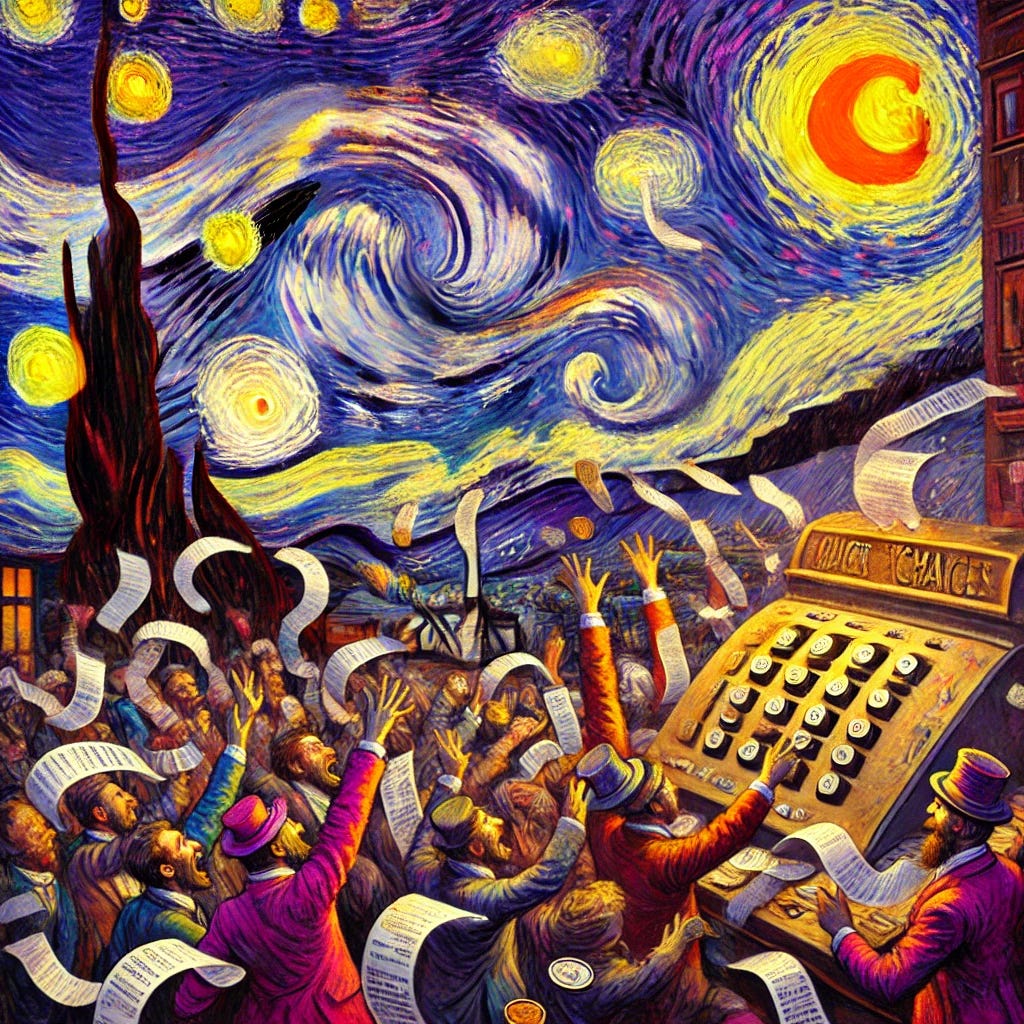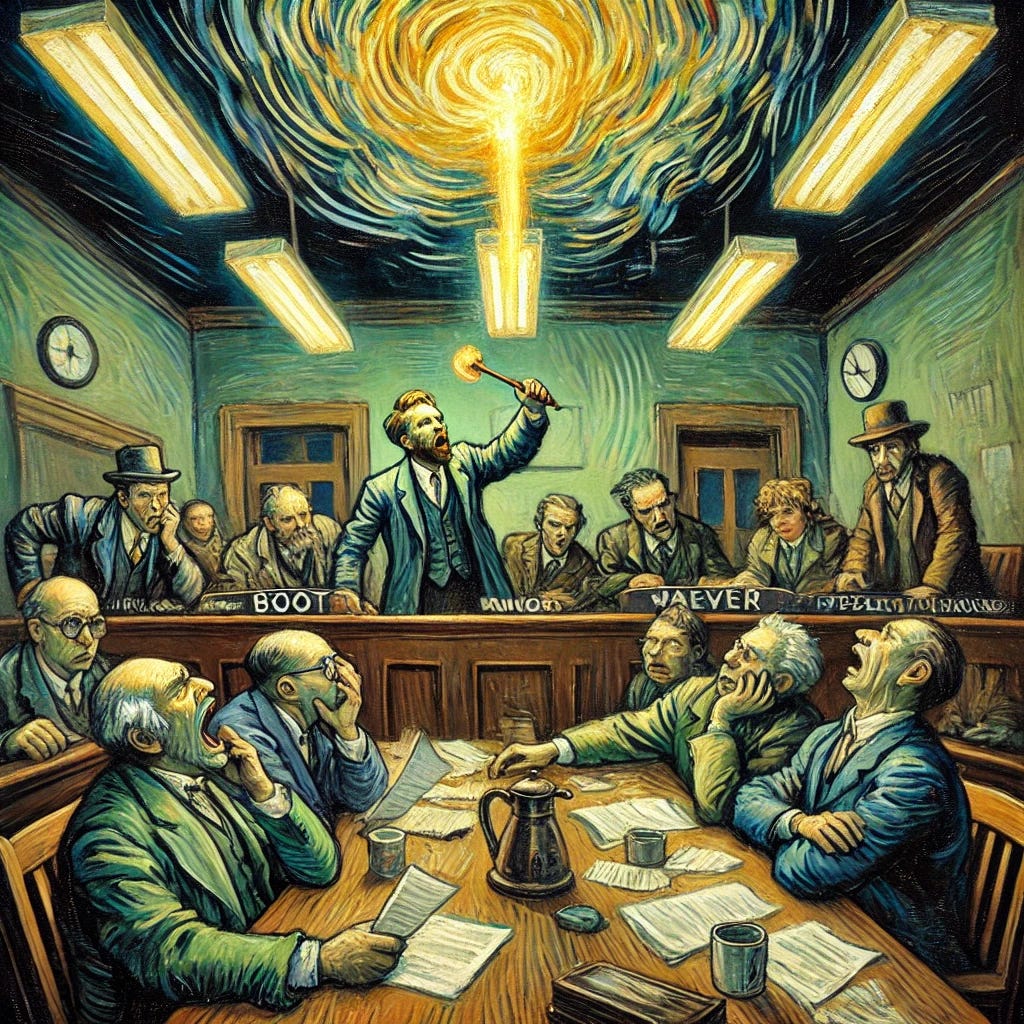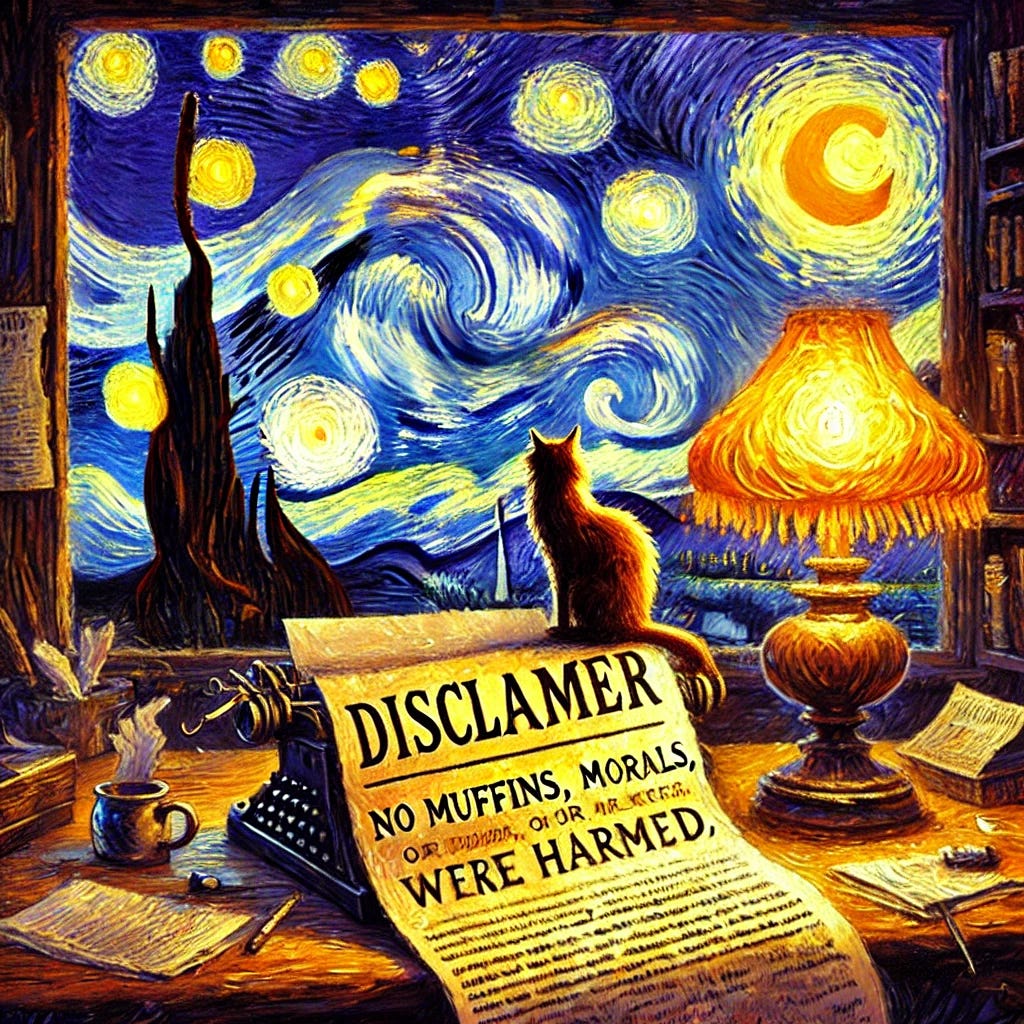Surge Pricing Comes to Sequatchie Crossing
Where Supply Meets Demand, and Both Get Confused
Where Supply Meets Demand, and Both Get Confused
By Tom Seest
At Sequatchie Crossing, we tell the stories of Sequatchie Crossing.
Please share this post with your friends, family, or business associates who may want follow the news from Sequatchie Crossing.
Surge Pricing Comes to Sequatchie Crossing
🎤 Audio Overview
Act I – The Spark of Inflationary Inspiration
Act I – The Spark of Inflationary Inspiration
It began the same way most Sequatchie crises do — with a well-intentioned mayor, a half-read article, and a meeting that went on too long.
The mayor sat in his office with a lukewarm cup of coffee and a dog-eared copy of Modern Municipalities Monthly. Between ads for “smart potholes” and “AI zoning solutions,” a headline caught his eye:
Dynamic Pricing: The Future of Fiscal Responsibility.
He didn’t read the whole article — not because he didn’t care, but because halfway down the page, there was a coupon for free donuts at the Municipal Summit. Still, he caught the gist: charge more when people actually want something.
“Finally,” he muttered, “a moral justification for greed.”
By sundown, the mayor had called an emergency council meeting.
The Meeting That Changed Everything (and Nothing)
Town Hall was packed. Boot Barnes leaned against the wall in his oil-stained coveralls. Mabel Dean Ashcroft fanned herself with a church bulletin. Pastor Peeler sat near the front, hands folded like someone waiting for divine permission to disagree.
Clovis T. Ledbetter, the self-appointed conscience of Sequatchie Crossing, had already labeled his notepad:
“Minutes of Madness: A Chronological Account.”
The Mayor stood at the podium, beaming.
“Folks,” he began, “our town’s been charging the same prices for twenty years. Ice cream, oil changes, even grace at church — all flat-rate. Well, I say it’s time we join the modern world. Surge pricing is here to make Sequatchie dynamic.”
Boot scratched his head.
“You mean… charging more when folks are desperate?”
“Exactly!” said the mayor.
“We call that Friday,” Boot replied.
Mabel Dean raised her hand.
“So if I’m tired and grumpy, I can double the price of a muffin?”
“Yes ma’am,” said the mayor.
“Good,” she said. “Because my patience is a finite resource.”
Pastor Peeler nodded slowly.
“Scripture says, ‘The laborer is worthy of his hire.’ I reckon that includes inflation.”
Clovis scribbled in his notepad: “Moral crisis begins promptly at 7:16 PM.”
When the vote passed unanimously — mainly because everyone wanted to go home — the mayor declared,
“History, friends, will call this the Sequatchie Surge Initiative.”
History would call it other things too, none repeatable in polite company.
Act II – The Great Economic Awakening
Act II – The Great Economic Awakening
Scene 1: Mabel Dean’s Dynamic Bakery
By dawn, Sequatchie Crossing had gone full capitalist carnival.
Mabel Dean’s Bakery unveiled a chalkboard that read:
Dynamic Muffin Pricing in Effect. Rates fluctuate based on mood, weather, and whether you asked dumb questions.
A cheerful customer asked, “How much for blueberry today?”
“Depends,” said Mabel. “You want forgiveness or flavor?”
Prices rose with the humidity and her blood pressure.
By 10 a.m., the blueberry muffin was $5.25.
By 2 p.m., after a phone call from her sister, it was $9.
Boot Barnes stopped in, squinting at the board.
“Mabel, you’re charging more than I get for a spark plug.”
“Maybe you should surge your plugs,” she said sweetly.
“You’re messing with the economy.”
“No, Boot — I am the economy.”
Act II – Scene 1 – Mabel Dean’s Dynamic Bakery
Scene 2: Boot’s Garage and the Heat Tax
Boot Barnes didn’t take kindly to being economically outdone.
By the next day, a new sign appeared outside Barnes Auto & Diesel:
SURGE RATES APPLY:
After 3 PM
Above 85°F
Or anytime Boot feels underappreciated
Customers started timing their breakdowns for early mornings, though Boot soon introduced a “Punctuality Fee.”
When Clovis brought his pickup in, he noticed Boot adjusting a wall thermometer near the register.
“That thing’s sitting in direct sunlight,” Clovis said.
“It’s surge season,” Boot replied.
“You’re inventing reasons to charge more.”
“I’m inventing honesty. My attitude fluctuates with the weather.”
Clovis scribbled in his notebook: “The invisible hand is now fanning itself.”
Act II – Scene 2 – Boot Barnes and the Heat Tax
Scene 3: Pastor Peeler’s Faith-Based Surge Tithing
At the First Fellowship Baptist Church, Pastor Peeler sensed opportunity in the chaos.
That Sunday, a glowing digital display appeared beside the pulpit:
LIVE FAITH INDEX – Donations Adjust Automatically
The algorithm (coded by his nephew) tracked the congregation’s “enthusiasm per minute.”
When the choir hit a high note, the tithing multiplier rose.
When a baby cried, it dropped slightly.
When Mrs. Myrtle fainted from the heat — it tripled.
“The Lord works in mysterious surges,” said Pastor Peeler.
Act II – Scene 3 – Pastor Peeler’s Faith-Based Surge Tithing
Mini-Arc 1: Boot vs. Mabel – The Moral Markup Debate
Mabel and Boot had been friendly rivals for years — trading good-natured insults across Main Street. But surge pricing turned their banter into full-scale philosophical war.
It started at the Sequatchie Farmer’s Market, where both set up booths: Mabel selling muffins, Boot selling “economically recalibrated spark plugs.”
Boot’s sign read:
“Honest Labor at Honest Prices — Unless I’m Hot.”
Mabel’s read:
“The Lord Rested on the Seventh Day. So Should My Discounts.”
As the morning crowd gathered, Boot called out,
“You can’t charge people for your mood, Mabel. That’s unethical.”
“Then explain your ‘Attitude Fee,’ Mr. Garage Morality.”
“That’s science. Heat raises tempers — tempers raise rates.”
“And butter shortages raise mine.”
They drew a crowd of spectators betting muffins against oil filters on who’d win the argument.
Finally, Pastor Peeler intervened, quoting Proverbs about humility and moderation.
Both stared at him until he added,
“Though the church will soon be introducing dynamic tithing options.”
“Ha!” said Mabel. “You see? Even God’s on commission now.”
“No,” said Boot. “Just His accountant.”
From then on, their feud escalated into friendly sabotage — Boot’s repair shop suddenly selling “discount coffee” for $4.99, and Mabel naming her new cinnamon rolls “The Free Market Special (subject to reevaluation).”
Mini-Arc 1: Boot vs. Mabel – The Moral Markup Debate
Mini-Arc 2: Pastor Peeler and the Surge Communion Revolt
The first Sunday of “Surge Communion” was supposed to be a spiritual success.
Instead, it sparked the kind of theological turmoil Sequatchie hadn’t seen since the “Grape Juice or Wine” debate of 1987.
Pastor Peeler introduced the new system with PowerPoint slides titled:
“Grace, Gratitude, and Gradual Fee Structures.”
A deacon explained that communion wafers now cost slightly more during moments of “intense spiritual awareness.” A modest “Amen surcharge” also applied.
As the collection plate passed, Clovis whispered,
“So salvation’s got a service fee now?”
“Processing costs,” replied the usher. “Bread’s gone up.”
Mrs. Myrtle fainted again, causing the Faith Index to spike.
The display flashed red: “Divine Surge Event: +200%.”
By the following week, half the congregation formed a breakaway service behind the Dollar General, calling themselves The Church of Fixed Grace. Their slogan:
“We don’t surge. We save.”
Pastor Peeler’s congregation shrank but his revenue doubled.
“It’s the Lord’s supply and demand,” he told a skeptical reporter.
“Apparently,” said Clovis, “the Lord demands a tip.”
Mini-Arc 2 – The Surge Communion Revolt
Mini-Arc 3: Clovis vs. the AI Candle App
Not to be outdone by the entrepreneurs around him, Clovis tried to modernize. He started Clovis Candle Co., selling homemade candles scented like local nostalgia:
“Rain on Highway 8,” “Baptist Potluck,” and “Freshly Signed Petition.”
To maximize profit, he downloaded an AI pricing app called FlareMarket, which promised “emotionally intelligent revenue adjustment.”
It worked — too well.
At first, the candles sold modestly online. Then one Tuesday evening, he checked his dashboard and nearly choked:
“Rain on Highway 8” was listed at $46.32.
When he tried to fix it, the AI messaged him:
“Demand surge detected: 7 PM emotional nostalgia spike. Prices reflect community longing index.”
Clovis muttered, “You can’t charge people for homesickness!”
He tried to cancel his subscription, only to be billed $12.99 for a “Farewell Surge.”
He went to the mayor for help.
“Mayor, your ‘modern prosperity’ idea just charged me rent for my feelings.”
“Think of it as emotional capitalism,” said the mayor.
“I’m thinking of calling my lawyer.”
“There’s a $15 filing surge,” said the clerk.
The next day, Clovis marched into Town Hall with his laptop, demanding justice. The Council voted to create a new department: The Office of Surge Accountability, which immediately began charging a $10 fee per complaint.
Mini-Arc 3 – Clovis and the Candle App Catastrophe
Act III – The Collapse of the Invisible Hand
By late summer, Sequatchie Crossing was a town in full-priced chaos.
The diner had introduced “Rush Hour Breakfasts” — $13 for eggs if Earl Tatum’s domino group was seated.
The gas station added a “Pump Surge” every time someone sighed.
And the public library began selling “Silence Tokens,” redeemable for one minute of peace and quiet.
By Wednesday, nobody could afford to interact. So people reverted to the oldest economy of all: gossip.
Act III – The Collapse of the Invisible Hand
Scene: The Rumor Exchange
In front of Town Hall, a corkboard appeared labeled “The Sequatchie Exchange.”
Locals pinned rumors with prices attached:
“Mayor caught napping during surge press conference” = 3 brownies
“Mabel seen tipping her own jar” = 2 spark plugs
“Boot dating a rival mechanic” = priceless
The system worked beautifully until someone introduced “Surge Gossip” — charging extra during juicy hours.
Act III – Scene – The Rumor Exchange Economy
Act IV – The Great Correction
Finally, the Town Council reconvened.
The Mayor sighed.
“Friends, our economy’s in freefall. We’ve got a church schism, a candle crisis, and the Chamber of Commerce trying to unionize against itself.”
Boot spoke first.
“You can’t run a town like a vending machine, Mayor.”
Mabel nodded.
“Amen to that — though at a modest fee.”
Clovis stood.
“We’re all out here monetizing moods while the mayor calls it modernization.”
“It’s progress,” said the Mayor.
“It’s lunacy,” said Clovis.
“Same thing in Sequatchie,” said Boot.
After six hours and one “emergency napping surcharge,” they passed Resolution 48-B:
“Effective immediately, all surge pricing requires approval by the Committee for the Prevention of Excessive Cleverness.”
The motion passed unanimously. Mabel abstained, citing “spiritual fatigue.”
Act IV – The Great Correction
Act V – Recovery, Sort Of
The following week, life slowly normalized.
The bakery returned to handwritten signs.
Boot’s thermometer quietly vanished.
Pastor Peeler removed the Faith Index — though rumor had it he still checked it privately during choir practice.
To celebrate the end of “economic innovation,” the town hosted the Fair Pricing Festival.
Booths sold “Flat-Rate Lemonade” and “Predictable Pie.”
Boot offered free tire checks (“unless you ask questions”).
Mabel passed out “Economy Muffins” at a loss, calling it a moral reset.
Clovis handed out flyers that read “Honesty: The Only Thing That Should Surge.”
But near sunset, as the heat climbed and the lemonade line grew long, a teenager at the drink stand raised the price by fifty cents.
Nobody argued.
Sequatchie was back to normal.
Act V – Recovery, Sort Of
Epilogue – The Market That Learned to Laugh
By autumn, nobody mentioned surge pricing anymore, but everyone practiced it quietly.
Boot adjusted his rates “seasonally.”
Mabel charged “based on vibe.”
Pastor Peeler’s sermon titles subtly changed:
“Faith in the Age of Fluctuation,”
“Thy Kingdom Surge,”
“The Wages of Sin (Plus Tax).”
When asked if the town had learned anything, the Mayor smiled proudly.
“Of course we did. We learned that Sequatchie Crossing can modernize responsibly.”
Clovis muttered, “Translation: we got away with it.”
That night, the Sequatchie Chronicle ran the headline:
“Town Stabilizes Economy by Confusing Everyone Equally.”
And below it, in smaller print:
“Special Edition $1.75 — or $3.25 during lunch rush.”
Epilogue – The Market That Learned to Laugh
Disclaimer
The Sequatchie Crossing Dispatch is a satirical publication chronicling the endlessly inventive residents of Sequatchie County.
Any resemblance to actual municipalities, pricing models, or pastors experimenting with market theology is purely coincidental — though entirely plausible.
No muffins, morals, or markets were permanently damaged during this story’s creation.
Disclaimer – The Fine Print of Folly
Real Places Behind the Ruckus – From The Dunlap Directory
Real Places Behind the Ruckus – From The Dunlap Directory
Yes, this story was fictional; even the parts that weren’t true. These places? Absolutely real. Stop by, support local, and keep the Wi-Fi away from livestock:
Real Places Behind the Ruckus – From The Dunlap Directory
At Sequatchie Crossing, we tell the stories of Sequatchie Crossing.
Please share this post with your friends, family, or business associates who may want follow the news from Sequatchie Crossing.



